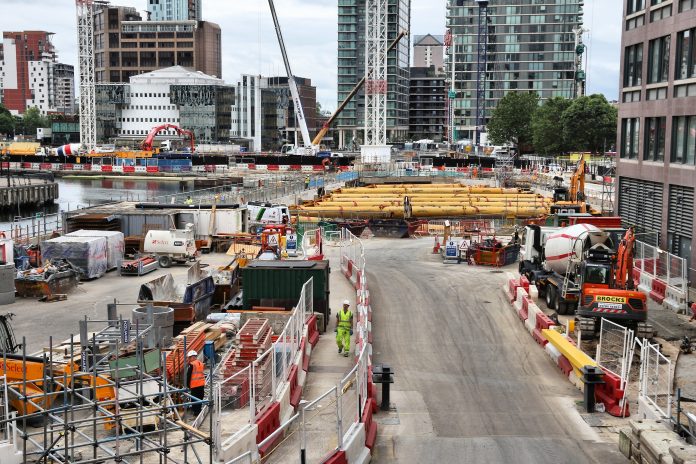Bev Hurley CBE, Chair of the Institute of Economic Development, ponders how construction spend can address the significant inequalities facing disadvantaged and left-behind communities
The construction sector is the sixth-largest source of employment in the UK, contributes nearly 7% of the UK’s GDP and is a major recipient of public spending – it is critical for placemaking, economic development and job creation, all of which highlight its importance to Boris Johnson’s ‘New Deal’ and post COVID-19 recovery.
With construction spend estimated to be £500 billion by the end of this decade, there is also a need to make sure that every one of those pounds delivers additional tangible social impact, and makes a major contribution to addressing the significant inequalities faced by our most disadvantaged citizens and left-behind communities.
The Social Value Act, published in 2013, is a requirement for people who commission public services to think about how they can also secure wider social, economic and environmental benefits. Before they start the procurement process, commissioners must, therefore, determine how they can secure maximum benefits at all stages of the project for their local communities.
Given the significance of construction to our economy, we undertook this research to support greater understanding of what ‘good practice’ social value looks like, and to find and share examples where innovative, replicable and impactful social value has been delivered at all levels of place-based interventions as a result-
Our final report, From the Ground Up – Improving the Delivery of Social Value in Construction, found, amongst many challenges in this area, that there is no common, comprehensive definition of what counts as social value, to frame understanding, benchmarking or reporting, and aid comparison of tenders and to determine best practice. This has given rise to significant disparities in what counts as social value activities, and no requirement to focus on improving the wellbeing of those who are most disadvantaged.
In response, we have made five recommendations:
1. Establish a Construction Social Value Centre of Excellence
The Centre will work collaboratively with industry and public sector bodies to help define social value, provide thought leadership, support and guidance, be a repository for social value reporting data, benchmarking, monitoring and evaluation, develop a kitemark, provide guidance on evaluation tools, and support the collection and dissemination of good practice case studies. We recommend that this be funded by government, in the same way that Be The Business and the What Works Centre are – the return on investment to be gained will far outweigh the cost. Such a Centre will increase communication, knowledge, understanding and collaboration and help defragment a complex, competitive, confusing marketplace. It will provide a longer-term perspective to help all learn what good practice looks like in terms of outcomes, legacy and impact, and who delivers it.
2. Agree on a definition of social value, and what activities are within scope, for the construction sector
This is absolutely essential to allow robust comparisons of value, and help ensure that social value requirements are proportionate and appropriate, and provide measurable additionality. We recommend that environmental components are separately weighted in procurement, and that good business practices (e.g. internal diversity/inclusion initiatives, prompt payment codes, training of existing supply chains, modern slavery, managing noise or disruption) should be considered as a given. Activities which may be commercially beneficial to the supplier, such as apprenticeships and educational visits, could be considered as social value if supported by a robust needs analysis in the area.
3. Update the Treasury Green Book, the Social Value Act and initiate mandatory reporting
Improve Treasury guidance on the monetisation of social value metrics and enable the assignment of different financial values to social value activities according to different areas. Social value must be considered in relevant aspects of the Five Case model (such as the economic, commercial and financial cases) so that it is considered in the early stages of the project lifecycle. New rules should allow the social value delivered outside of a project area to be included in business case and procurement calculations and incentivise the procurement of outcomes, not outputs. Authorities should be required to create a social value plan as an integral part of their economic development strategy, based on a needs assessment to provide one context for all bidders, and to monitor and report annually on social value outputs and outcomes, including their cost-effectiveness. Local Industrial Strategies and COVID-19 local recovery plans must also give due consideration and action to social value and impact.
4. Upskill the public and private sector
The Centre for Excellence will work collaboratively to offer Continuing Professional Development on all aspects of social value, from defining a strategy, embedding it in procurement and at all stages of project lifecycles, and understanding the tools to assess social value components, through community engagement, local spending, pre-tender consultation and education about modern construction, to monitoring, evaluation and legacy. There is a need, especially in cross-boundary infrastructure projects, to increase collaboration, political leadership and to develop a clear framework for social value delivery. Greater understanding and clarity of what social value is, how to procure it more effectively, and how to achieve better outcomes, will ultimately improve capacity, capability and impact.
5. Upskill those not in the Supply Chain: SMEs and Voluntary and Community Sector (VCS) organisations
Considering the growing impetus towards local spending requirements, we recommend that industry must help improve local SMEs and VCS organisations’ ability to compete, to deliver and to grow, and by doing so, leaving a more enduring local legacy. Improving their capacity and capability will extend beyond just the construction industry. Industry must ensure that prompt payment codes are adhered to at all levels of the supply chain, particularly at the bottom where the pressure of late payments is felt most. Public authorities should provide information and contacts at the pre-tender stage of businesses and community organisations who might be utilised for the delivery of social value.











